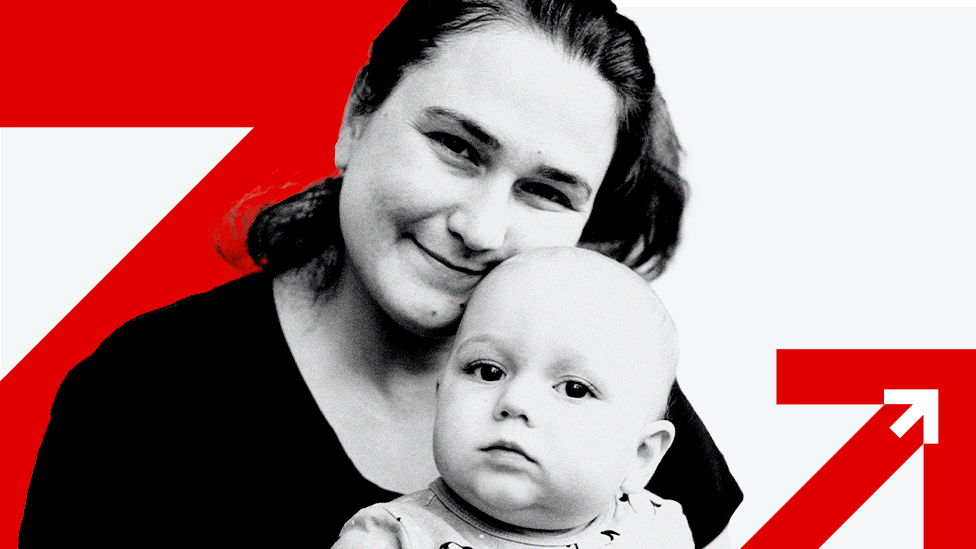Tory think tank Bright Blue calls for ‘minimum income’
- Published

A Conservative think tank has said the welfare system is not providing enough support for people, and has called for the introduction of a "minimum income".
Bright Blue, backed by some senior Tory MPs, says households need a minimum income to meet the cost of living.
Former Work and Pensions Secretary Stephen Crabb said the welfare system has "significant gaps and weaknesses".
The Department for Work and Pensions (DWP) insists it still "offers a vital safety net to millions of people".
The government is currently considering options to reform the welfare system to encourage more people back into employment.
One option is letting people continue to claim sickness and disability benefits even if they find work, with a source telling the BBC there has to be a "radical rewiring" of how the benefits system operates.
A Health and Disability White Paper detailing the new plans - which are yet to be finalised - is expected later this year.
Labour has outlined plans to reform the system should it win power, announcing that claimants who take a job but then have to stop working within a year would not have to undergo another capability assessment to claim benefits again.
What does the report say?
The new report by Bright Blue was guided by a cross-party commission of politicians, including Tory MPs Mr Crabb and Shaun Bailey and Labour's Baroness Lister.
It calls for the introduction of a "minimum living income", with benchmarks for different types of households - similar to national living wage rates for people of different age groups.
The report recommends that the government's advisory committee on social security should then recommend minimum levels of uprating - or payments - to make sure households meet this minimum income.

The DWP says it recognises the pressures of rising living costs, and has delivered direct help to those most in need
It argues that caps on benefits should be reviewed periodically to check whether they are affecting people's ability to meet the cost of living, and that a benchmark should be set under which benefits cannot fall, even if the recipient was sanctioned.
Secondly, the report calls for a new digital platform for Universal Credit claimants, which would process all benefits and grants available to low-income working age adults.
It says this could notify claimants when they might be eligible for more support, and give people more control on how often - and where - they receive their benefit payments.
Thirdly, it argues that the government should introduce a new "Contribution Element" to Universal Credit.
They propose this could involve a new category of National Insurance that employees could voluntary opt-out of.
It would mean if people paid into the scheme and then found themselves unemployed they could receive more generous support in return than the current Jobseeker's Allowance currently allows.
Bright Blue says its report was based on extensive polling of Labour and Conservative voters, and of think tanks, over several years.
System 'meant to fail people'
In a statement, the DWP said it recognised the pressures of rising living costs, and delivered "£1,200 of direct help to those most in need this financial year, including £400 towards energy costs".
It added that benefits would be increased in April by 10.1%, in line with inflation, and other schemes were in place to help households with essential costs.
Aga, who has relied on Universal Credit since she was made redundant, told the BBC she "immediately felt like the social security system [was] meant to fail people".
"The process of accessing Universal Credit, and other forms of support, can be difficult and unclear," she said.
"With this lack of clarity, I am left feeling like I have no control and there is no-one who can help me and guide me. It leads to situations where I can't even afford to buy coats for my children this winter."
"I have tried to leave Universal Credit, whether through self-employed work or other means, but I am scared of what this will mean," she added. "Will I still be able to support my family and what happens if I need UC? Will it still continue to help me? I'm not sure."
Mr Crabb, who was the secretary of state responsible for the welfare system in 2016, said: "Our social security system continues to do much of the heavy lifting when it comes to shielding families from extreme poverty. But it is clear significant gaps and weaknesses in provision remain."
"The proposed social security digital platform will improve accessibility to the full range of benefits and a serious discussion about a positive contributory system could open the door to a fairer system overall," he added.
- Published15 February 2024

- Published7 November 2022


